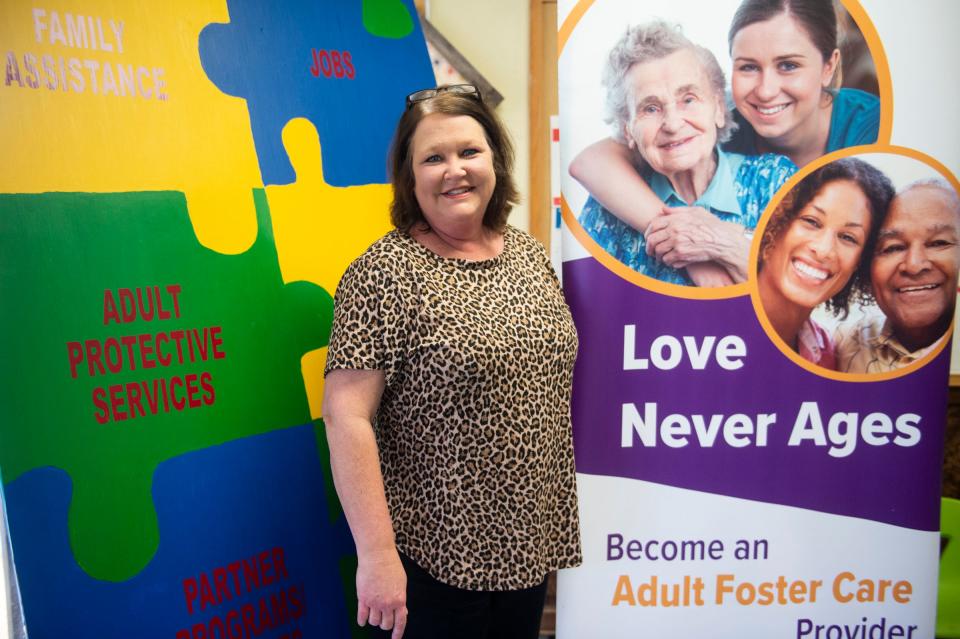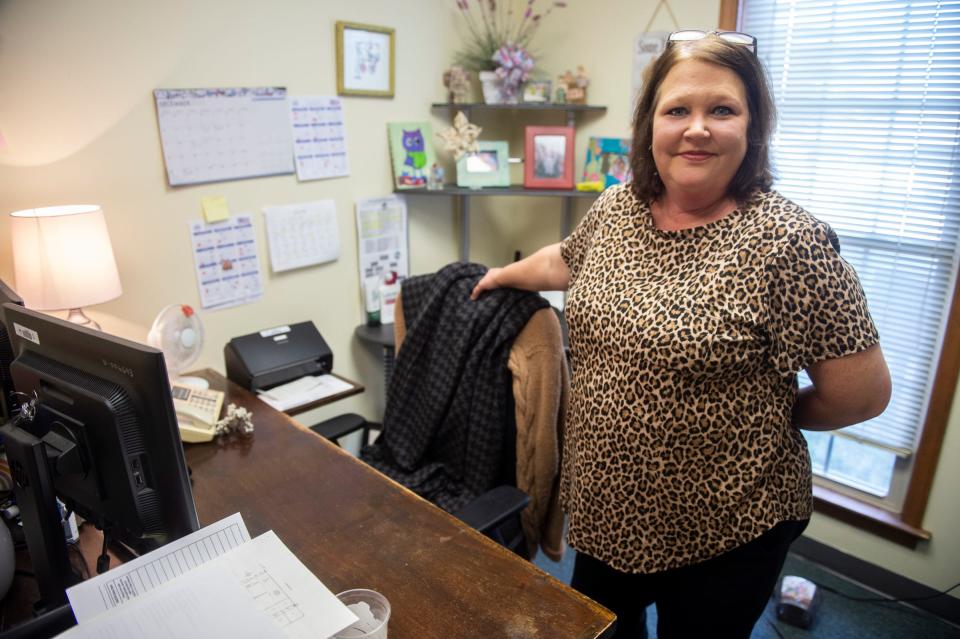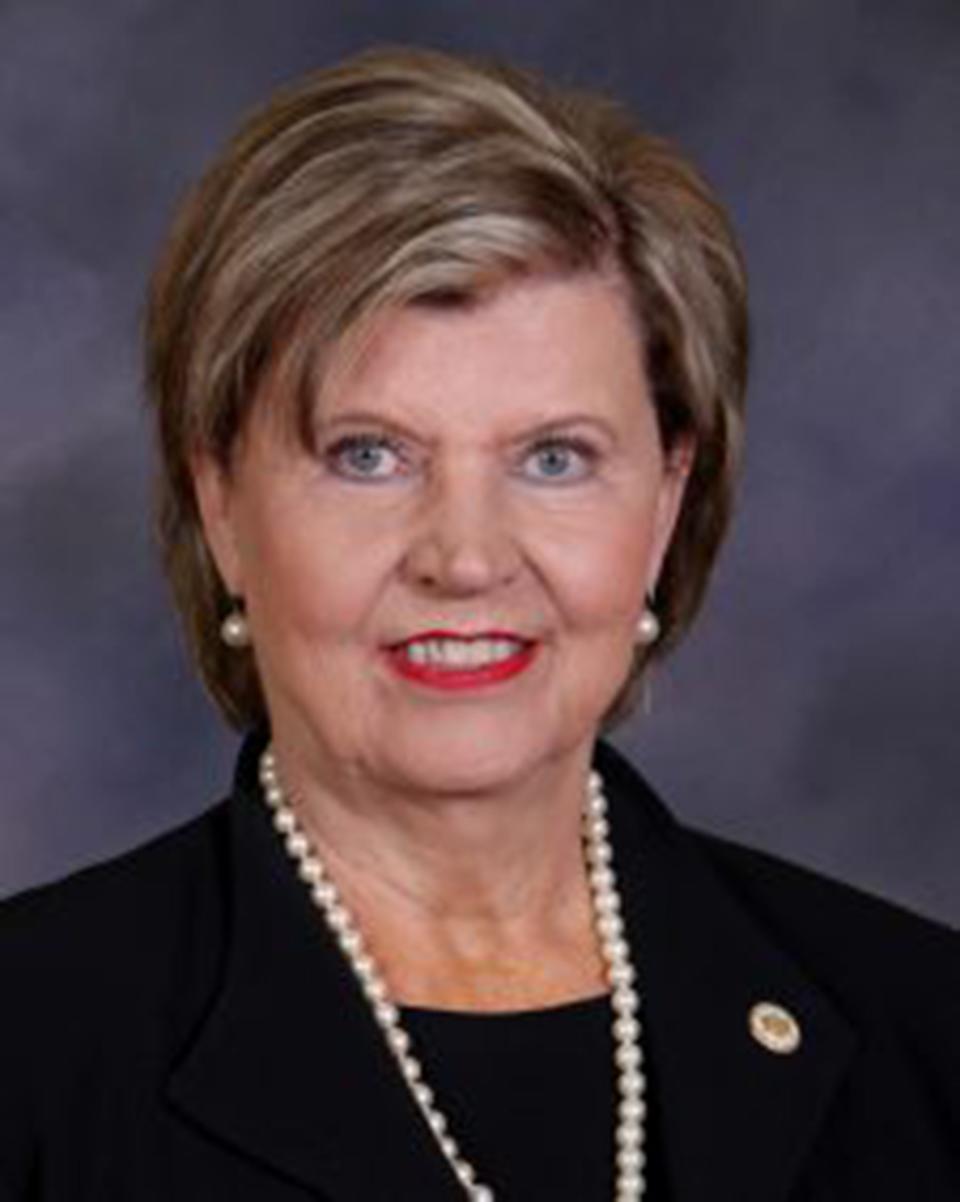Elder abuse reports are up in Alabama. Here's what investigator Amy Floyd does about them.
This is Part 2 in a series about the arduous tasks of aging and caregiving in Alabama. This story was produced with support from Columbia University’s Age Boom Academy.
A few years ago, Amy Floyd walked into a house in rural Pike County to find a man starving to death.
He was intellectually disabled, and the family member who was supposed to be caring for the man was dealing with mental health issues of their own. The caretaker left the man in deplorable living conditions, with no running water, minimal food and no way of helping himself.
Floyd wasn’t shocked or scared when she saw the situation. She was glad — not that he had suffered, but that he wouldn’t have to anymore. She knew how to help.
After graduating from Troy State, now Troy University, in 1994, Floyd devoted her time and energy to social work. She started in a long-term care facility as a caretaker for geriatric patients before finding her place at the Alabama Department of Human Resources.

Part 1:'Send me some more hands': The struggle of caring for parents with Alzheimer's
Part 3:Elder abuse reports are up in Alabama. Here's what investigator Amy Floyd does about them.
It’s been nearly 10 years since she joined DHR, and Floyd has investigated hundreds of cases of abuse, neglect and exploitation, many of which have led to criminal convictions.
Now, in Pike County, she is one of the few employees solely dedicated to protecting elderly and disabled adults as part of the Adult Protective Services Division.
“Everybody deserves somebody having their back, especially with this population that I work with,” Floyd said. “I go out and assess the situation, see what might be going on, what we can assist with, and try to connect with resources to better their situation, if there's a need.”
That’s exactly what she did when she found the man starving in his rural home years ago. With DHR resources, Floyd was able to immediately remove the man from his situation and move him into a care facility where he still lives today.
The workers there love him, Floyd said. He has put on a healthy amount of weight, bathes every day, and has access to proper medical care. She checks in on him regularly.
“Had maybe DHR intervened earlier — and I mean some years earlier — I think he would be thriving even better than he is now,” Floyd said. “He’s done really well since taking him out of that environment that he was so oblivious to.”
That experience is one that Floyd looks back on when her job gets tough. Situations like these don’t always turn out so nicely.
‘The work doesn’t leave you’
Floyd leaves goes home from her office at 4:30 p.m. most days, but her heart and mind are often there at all hours of the night.
Alabama state law tasks county DHR offices with the responsibility of providing protective services to people with mental or physical disabilities who are unable to provide for “basic needs for shelter, food, clothing or health care, and whose health or safety is in immediate danger,” when these situations are brought to the office’s attention.

The county DHR offices work closely with the courts to move quickly when social workers like Floyd identify individuals who are no longer safe in their living situations. When this happens, Floyd said family members can become angry and defensive, even if they are the reason it’s happening.
Legal intervention is the last resort.
Still, adults can refuse help. Relatives and caregivers can oppose DHR petitions for court orders allowing the department to arrange for a person’s care. Immediate action is sometimes prohibited.
“You have situations where your hands are kind of tied. Maybe you feel like they should be removed from the home, but, you know, after further assessment, you're like, ‘OK, we just don't have enough right now.’ So, you worry,” Floyd said. “You can leave the office, but the work doesn’t leave you.”
Pike County’s need for an adult foster home
Ideally, when an adult needs to be removed from their home, that person will be able to move in with another family member or into a nursing home. When that can’t happen because of a lack of availability, the next option is an adult foster home.
Floyd said most people don’t even know adult foster homes exist, though they are in high demand.
Alabama currently has about 19 approved adult foster homes throughout the state. Nearly half of them are in Mobile County, while Pike County has none.
“There's a big campaign from our Adult Protective Services Division at the state level to recruit these foster homes across the state,” DHR communications director Dominic Binkley said. “There's a big need for them because it allows them to stay in a home setting rather than a facility. It's better for their overall well-being, I would say.”
Binkley also said that the number of reports of suspected elder abuse that DHS receives has increased every year, apart from 2020.
In fiscal year 2021, there were 11,122 reports, and in 2022, that number jumped to 12,033.
The department tends to see an uptick in reports during the summer and around the holidays.
“It’s family members who are coming home to visit mom, dad, grandma, whoever, at those times,” Floyd said. “They're seeing things that aren't right, things that are not what they were a year ago."
An informal network of supporters
Even though the department is aware of more people than ever who need help, that doesn’t mean there are more resources available. Social workers can feel spread thin, especially in rural areas like Pike County.
The county has a population of just over 33,000, and over half of them live in Troy, the growing college town. Everyone else is scattered about in small towns like Goshen, Banks and Brundidge. They’re no more than a 20-minute drive from Floyd’s office, but when she has multiple people to check on each day and new reports to investigate, the driving times add up.
That’s where her “informal network” comes in.
Floyd grew up in Troy and has lived in Pike County for all of her life. She knows someone in just about every town — or she knows someone who knows someone else.
When she gets calls from people who need help getting to doctor’s appointments, buying groceries or even making rent this month, Floyd either does it herself or calls up someone in her network.
Her supporters include individual friends, family, former coworkers, the Pike County Board of Realtors, Troy First United Methodist Church, The Burning Bush, Troy First Baptist Church, East Central Mental Health and plenty of others.
“Most of the time, they say, ‘Yeah, just tell me when, where and what, and I'll do it.’ That's one of the great things about being in a rural area. We're very close-knit,” Floyd said. “The individuals that I call, they know when I call them, there's a good reason. I’m so very, very blessed for this community and the support that they give to our Adult Protective Services Unit here.”
Floyd honored for her work
Whether it is a learned or innate quality, Floyd is humble when it comes to talking about her impact. While she’s passionate about her work, she said she didn’t know if her life or work was “interesting enough” to others.
When she won the Alabama Spirit of Adult Protective Services Award in 2022, she said she was grateful, but she was sure there were other social workers who “were probably more deserving.”
Others, though, will speak for her.
DHR Commissioner Nancy Buckner said Floyd exemplifies “the passion, empathy and giving nature that make a successful social worker.” Pike County DHR Director Patricia Faircloth said Floyd “has touched the lives of countless community members through her generosity and passion for protecting the vulnerable.”
Meanwhile, Floyd prefers to identify herself as someone who simply likes to help people.
The signs of abuse
With the number of suspected elder abuse reports on the rise, DHR encourages the public to recognize the signs of abuse, neglect and exploitation.
“A sharp eye is the best defense against elder abuse, neglect and exploitation,” DHR Commissioner Buckner said. “I urge all Alabamians to watch for the warning signs and speak up at the first sign of harm. We value older adults in Alabama, and we all must do our part to keep them safe.”

These signs can include: increased fear or anxiety, isolation from friends or family, sudden changes in behavior or sleep schedules, unexplained injuries or bruises, poor hygiene, unusual changes in spending or changes in a will.
If you or someone you know needs help with an abusive situation, you can call the Adult Abuse Hotline at 1-800-458-7214, email aps@dhr.alabama.gov or contact your local DHR county office.
Hadley Hitson covers the rural South for the Montgomery Advertiser and Report for America. She can be reached athhitson@gannett.com. To support her work, subscribe to the Advertiser or donate to Report for America.
This article originally appeared on Montgomery Advertiser: Inside Alabama Adult Protective Services as reports of elder abuse increase

